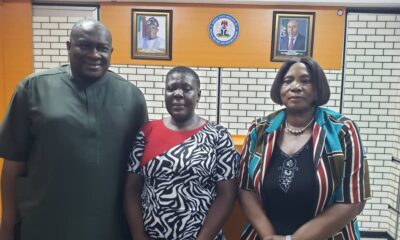News
JAMB: ‘Only 10 Candidates Can Use Computer In A Hall Of 250’
An invigilator at the just concluded Joint Admission and Matriculation Board (JAMB) examination, has taken to the social media to share what is a shocking revelation about the computer literacy level of the prospective higher institution students.
Since the introduction of the Computer Based Test (CBT) in 2013, there have been the challenges of students mastering the act of using the computer, which has led to various shortcomings after the examinations.
Eniolaoluwa, who was an invigilator, shared on her Twitter handle her experience during the weeklong examinations.
“Okay so I just finished invigilating JAMB exams and all I can say is we have a very big problem that we are not aware of.
“In a hall of about 250 JAMB candidates, only 10 can successfully use a computer system. The rest cannot just understand how the computer works; they are terrified at the sight of a mouse.
“They cannot left click, they cannot pick their answers using the mouse or the keyboard, they cannot scroll, they cannot delete when they make a mistake, and they cannot locate letters on the keyboard.
“And JAMB has tried cos the candidates have the opportunity of doing mock exams, the purpose of mock is to expose them to computers and let them know what to expect in the day of their exams.
“Before they start the exam, JAMB has provided a short video for them, the video shows them how their questions will look like, how to answer questions, how to use the mouse, etc but some of them will call you and insist their pictures and reg numbers are not on the videos. How?
“The front page of their rough sheets also has instructions on how to use the computer. You can successfully write JAMB exam without using the keyboard, there are letters you can use and it is explicitly stated on the front page of their rough sheets but no.
“They still don’t understand how to go about it. One of the candidates called me and told me he wanted to submit, I looked at the screen and realised he hasn’t answered any question; apparently he has been double clicking.
“On the letters of the options, n then it highlights and he thinks he has picked the answers. He hasn’t answered any questions and at that time they had just 10mins to go, now tell me, how does he want to pass the exam?
“Meanwhile on the rough sheet and in the video it is clearly stated, press A if the answer is option A, press B if the answer is option B, etc, press S to submit, press N for previous and so but these candidates cannot just do it.
“Some submit without answering any questions, a candidate left after answering about 40 questions out of 180. If the computer hibernates all they just need to do is shake the mouse some would raise it up in the air…please how? Some would start saying prayers in Yoruba!
“Some cannot type in their reg number, they don’t know how to. At the front page of their rough sheets, JAMB explained the use of nine keys, a candidate called me to tell me he has ticked the nine keys on the rough sheet. I was like what the?
“Most cannot construct a simple sentence in English, you will start hearing ‘Iaff submit’, ‘I aff write it’, ‘ezzz not press’. Some will turn it to pidgin ‘I no fit do am’. My Yoruba people will say ‘edakunkote’, ‘mi o ri se’. Guys, it is bad.
“That means students that go to private schools are in the minority cos at the end of the day over 1000 candidates did their jamb in my center and about 50 can use the computer well. The restNahhhh.
“I asked one of them and he told me they have the only abacus in their school, ABACUS!!!! Do some secondary schools use abacus??? He said he has never seen a computer in his life. Of cos, we had this conversation in Yoruba cos we were struggling with English.
“They cannot comprehend, cos, if you ask them to explain the instructions at the front page of their rough sheet they cannot that, means they don’t understand what is written there, how then do they want to follow instructions if they can’t comprehend.
News
Fubara Attends PDPGF Meeting In Asaba …..Back Court Verdict On National Secretary Position

Rivers State Governor, Sir Siminalayi Fubara, last Friday, attended the Peoples Democratic Party Governors’ Forum (PDP-GF) meeting in Asaba, the Delta State capital.
The Rivers State Governor, who is the Vice Chairman of the PDP Governors’ Forum, attended the meeting, alongside 10 other Governors of the party’s controlled states across the six geopolitical zones of the country.
The first PDPGF meeting in 2025, was held at the Government House in Asaba, at the end of which a seven-point resolution was reached.
Reading the communique at the end of the meeting, the Chairman of the Forum, and Governor of Bauchi State, Senator Bala Mohammed urged the National Working Committee (NWC) to put every machinery in place to ensure a hitch-free NEC meeting on March 13, 2025.
The communique stated:
“The Forum, having examined all the notices required by law to be given to validly convoke NEC, advised NWC to reschedule NEC to the thirteenth (13Th) of March 2025.”
The Forum further noted the Court of Appeal judgment affirming Udeh Okoye as the National Secretary of the party, saying that as a party that believes in the rule of law, it will respect the position of the Appellate Court on the matter.
“The Forum noted with delight the ongoing efforts at resolving the crisis in the National Working Committee, NWC, on the position of the National Secretary, and has reaffirmed its support for the Court of Appeal judgment; consequently, the Forum advised the NWC to set up the machinery for the effective implementation of the court judgment.
“While commending the country’s valiant and patriotic Armed Forces and Security Agencies for maintaining the frontline in securing the country and the gains of our gallant personnel against bandits in parts of the country, the Forum viewed with deep concern, the resurgence of brazen non-state actors. It, therefore, calls for the strengthening of the nation’s security architecture.”
Governors in attendance include: H.E Senator Bala Abdulkadir Mohammed (Bauchi State); H.E Sir Siminalayi Fubara (Rivers State) – Vice Chairman; H.E Rt. Hon. Sheriff Oborevwori (Delta State) – Host; H.E Dr. Agbu Kefas (Taraba State); H.E Rt. Hon. Ahmadu Umaru Fintiri (Adamawa State); and H.E Dr. Dauda Lawal (Zamfara State).
Others are H.E Senator Ademola Adeleke (Osun State); H.E Senator Douye Diri (Bayelsa State); H.E Pastor Umo Eno Ph.D (Akwa Ibom State); H.E Dr. Peter Mbah (Enugu State); H.E Barr. Caleb Mutfwang (Plateau State);
and H.E Bayo Lawal (Deputy Governor, Oyo State), who represented Governor Seyi Makinde.
News
NGO Implants Free Pacemakers Into 22 Cardiac Patients In PH
A United States based Non Governmental Organisation, Cardiovascular Education Forum, in collaboration with the University of Port Harcourt Teaching Hospital (UPTH), has successfully implanted free pacemakers into 22 patients with different cardiac cases in Port Harcourt.
This is in a bid to save lives and encourage patients with low heartbeats to live longer.
The implantable device, which costs $20,000 each, was inserted free of charge on the selected patients.
Speaking during a Special Hospital Ground Rounds at the UPTH with its Theme, “Recent Advances in Cardiac Pacing,” a cardiac Physiologist, Dr Neil Grub, said the NGO was in Nigeria to improve training and learning on cardiac issues and help patients with cardiac problems.
Accompanied by a team of experts comprising a cardiologist and cardiac device implanter, Dr Jagdeep Siagh, and UPTH interventional cardiologist, Dr Edafe Emmanuel, Dr Grubb said pacemakers were inserted on patients with low heartbeats to boost their heart rates.
Earlier, the Chief Medical Director, UPTH, Prof Henry Arinze Ugboma, said each of the implantable devices cost over $20,000.
Ugboma, represented by the Chairman, Medical Advisory Committee, UPTH, Prof Datonye Alasia, said the partnership between UPTH and the foreign NGO was to build networks, and improve services in terms of healthcare delivery, training and learning.
According to him, there is now a ray of hope in terms of treatment of patients with cardiovascular cases in the hospital.
He said the UPTH started the collaboration with Cardiovascular Education Forum in 2018 to boost health, training and learning on cardiac health.
He assured that, “in coming years, the scale of our collaboration with the mission will be higher.”
Chinedu Wosu
News
FG Unveils National Broadband Alliance To Drive Internet Access
The Federal Government has unveiled the National Broadband Alliance, a new initiative aimed at transforming the nation’s digital infrastructure and boosting connectivity across the country.
The initiative was unveiled yesterday in Lagos by the Minister of Communications, Innovation, and Digital Economy, Bosun Tijani, who was represented by the Executive Vice Chairman of the Nigerian Communications Commission, Aminu Maida.
In his address, Tijani stated that NBAN would significantly enhance broadband penetration, which has grown from just six per cent in 2015 to approximately 42 per cent as of October 2024.
To support this agenda, he said the government was leveraging a Special Purpose Vehicle to deploy 90,000 km of fibre backbone across the nation, connecting underserved and rural communities to high-speed internet.
According to him, the initiative aligns with the Renewed Hope Agenda of President Bola Ahmed Tinubu, which prioritises innovation, technology, and collaboration as key drivers of national prosperity.
Tijani stated that the expansion would not only improve access to reliable broadband but also empower Nigerians, particularly in rural areas.
“While the progress made in broadband penetration is commendable, we recognise that much more needs to be done to ensure every Nigerian can enjoy the benefits of reliable, high-speed internet,” Tijani said.
The minister also emphasised the importance of strategic partnerships with donors, investors, and other key stakeholders in achieving the goals set out in the National Broadband Plan (2020–2025).
He said these collaborations would be essential in overcoming infrastructure development challenges and making broadband affordable and accessible for all Nigerians.
“These targets reflect our unwavering commitment to ensuring that broadband is accessible, affordable, and inclusive for all Nigerians. However, we are also aware of the challenges ahead,” he added.
Tijani stressed that achieving the government’s targets—70 per cent broadband penetration by 2025, a minimum internet speed of 25 Mbps in urban areas, and broadband access for 80 per cent of the population by 2027—will require sustained efforts.
“Achieving these goals will require more than just the efforts of the private sector. It will require a holistic approach that includes strategic partnerships with donors, investors, and other key stakeholders in accelerating the rollout of critical infrastructure,” he said.
-

 News9 hours ago
News9 hours agoNigeria Strengthens Economic Ties With Germany To Boost Investment, Jobs
-

 Featured6 hours ago
Featured6 hours agoFubara Flags Off Upgrading Of 135 Primary Healthcare Facilities In Rivers
-
Rivers7 hours ago
Bonny Protest Neglect, Seeks CSR MoU Implementation
-
Nation5 hours ago
FG Begins Tolling On Abuja-Keffi-Akwanga-Makurdi Highway
-
Business7 hours ago
NDYC Seeks NDDC Commercialisation … Uncompleted Projects Completion
-

 Rivers9 hours ago
Rivers9 hours agoCommissioner Promises Improved Working Conditions … Splashes N.1m On Outstanding Caregiver
-
Sports6 hours ago
Sports: 2nd Edition Of Inter-Tribal Tourney Kick-starts In Mbiama
-
Niger Delta7 hours ago
NACAT Inaugurates South-South Office In A’Ibom Against Corruption

